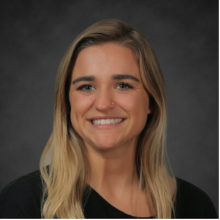Written by: Kaitlyn Laibe
From occupying student government offices, to contributing to international human rights law development, to representing incarcerated folks, LSJ students at UW have a far-reaching impact. In talking with Zoe Fielden, a 2019 UW graduate, I learned that LSJ alums are no different.
When Zoe Fielden graduated, she had already worked with the Seattle Clemency Project (SCP), a local non-profit dedicated to providing relief for incarcerated individuals who are serving lengthy sentences. During her time at SCP, Zoe was introduced to post-conviction work. She observed how, just like SCP, the King County Prosecuting Attorney’s Office was an active participant in many of the re-sentencing and early-release cases Zoe was working on. This provided her a unique view into how both the defense and prosecuting teams collaborated in some early-release cases. While she was familiar with the defense side, it was Zoe’s first look into “the considerations that the prosecuting attorney has to make and their role within the justice system.”
When Zoe accepted a job with the King County Prosecuting Attorney’s Office, she would come to learn even more about the prosecutorial role in re-sentencing cases. Shortly after Zoe joined the team, Dan Satterberg's Sentencing Review Unit (SRU) was established. The purpose of the SRU was to harmonize past practices with a modern approach to justice. In doing so, the unit hoped to address harm experienced by communities most impacted by tough on crime policies. On the day-to-day, this manifested as reviewing Washington state cases where individuals received a lengthy sentence that no longer served the purpose of justice. As a paralegal in the unit, Zoe spends most of her time reviewing requests for pardons, clemency, and re-sentencing. This work involves reviewing trial records, court documents, and post-conviction information, such as an individual's disciplinary and rehabilitative record in prison. In addition, the unit considers whether the person would have been charged or sentenced differently today, as well as how the person’s age, physical, or mental health may mitigate the risk they would pose to society.
The unit’s work does not stop there. When Zoe and her team decide an individual meets all their criteria, the Unit helps them find an attorney through the Seattle Clemency Project or the public defense bar. After assigning the individual a lawyer, the unit continues to work closely with the defense attorney in creating a comprehensive and successful re-entry plan. In most cases, when the individual comes before the Court, with the Prosecuting team’s recommendation, their defense lawyer, and co-created re-entry plan, the Court agrees that the individual, and the community, are no longer served by the continued incarceration.
The King County’s Sentencing Review Unit, which was created by Bill 6164 in March 2020, models prosecutor-initiated sentencing reform. As one of the first sentencing review units across the United States, Zoe’s team is constantly developing best practices for re-sentencing, which they are beginning to share with other jurisdictions interested in creating something similar.
Zoe’s work has been largely influenced by her LSJ education. As she explained to me, “LSJ gave me the framework for thinking about these big structural issues" and so “in many ways my current work is largely an extension of my LSJ education.” As she continues to grow familiar with the work, she credits LSJ for her ability to jump in and begin as quickly as she did, as well as giving her the tools to meaningfully contribute even in her beginning years. Zoe’s work in the King County’s Sentencing Review Unit is a perfect example of how LSJ continues to aid students after graduation and how the skills learned in the classroom are transferable to a variety of settings, no matter how new.
